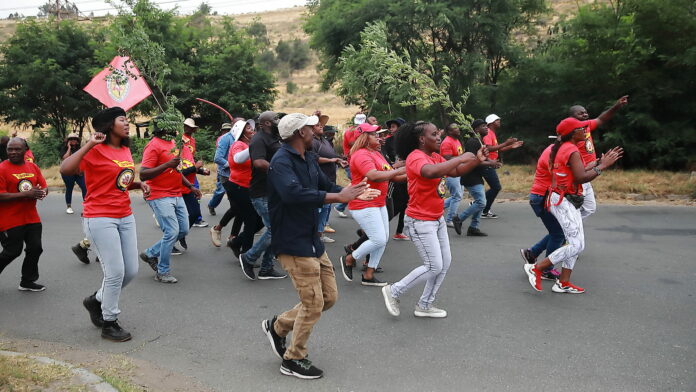
THE South African Transport and Allied Workers Union, the smaller of two unions that staged a rail and ports strike since October 6 has vowed to continue its industrial action, said Bloomberg News.
“The strike is going on,” Satawu spokeswoman Amanda Tshemese said by phone on Tuesday. “Our members made it clear that until we get a no retrenchment clause and what is due to them, the strike will go on.”
Rival union United National Transport Union agreed last night to a three-year pay deal with Transnet equal to a 6% increase. Satawu represents about a third of Transnet’s 55,827 full-time and contract staff, compared with the 24,992 workers that Untu represents.
The Minerals Council South Africa said last week that the strike was costing mining companies R815m a day in lost revenue. Fruit producers have also expressed concern that their harvests will rot at the docks, said Bloomberg News.
Satawu is willing to negotiate to end the impasse with Transnet as it’s aware of the “consequences” of the industrial action, Tshemese said.
The strike is another blow to South Africa’s economy, which contracted 0.7% in the second quarter, said Bloomberg News.
Economic growth faces more headwinds from state-owned power utility Eskom which is implementing rolling electricity outages due to frequent breakdowns at its power generation plants.
In addition, the pay deal that Untu agreed with Transnet undermines a pledge by the government to rein in state wages, the newswire added.
The remuneration of South African public servants accounts for almost a third of total government spending and keeping it in check is key to the National Treasury’s plans to reduce its budget deficit and bring runaway debt under control.
Speaking at the Joburg Indaba conference earier this month, Roger Baxter, CEO of the Minerals Council described the freight crisis as equal in importance to South Africa as load-shedding.
“Energy is much more obvious because people can see the energy crisis we are facing. Stage four load shedding is in our faces every day. But how many people know that at the logistics level the performance is as bad as what it is at the energy level?”, he asked during a presentation to the Joburg Indaba, a conference.
In a grim assessment Baxter spelt out the actual and opportunity costs in terms of revenue to the mining industry and lost taxes to the Treasury being caused by Transnet’s inability to rail target volumes. He estimated that an extra R151bn could be earned in annual export revenues if the “optimised” logistical levels were achieved across the country’s main bulk commodity exports.











